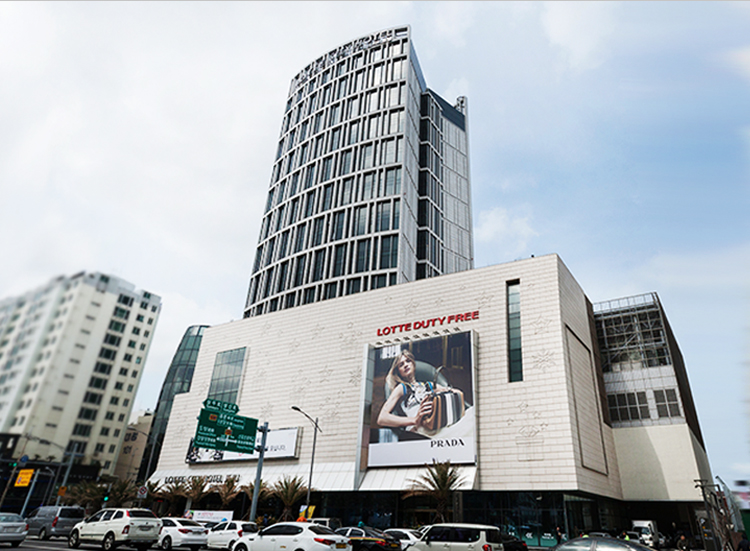SOUTH KOREA. Duty free sales countrywide fell by -53% year-on-year in May to US$828 million, writes The Moodie Davitt Report Senior Retail and Commercial Analyst Min Yong Jung* in Seoul.
The data, published by the Korea Duty Free Association, suggests little has changed from a difficult April but on-location channel checks by The Moodie Davitt Report show signs of the Korean duty free sales slump bottoming out.
The world’s biggest duty free market fell into negative territory year-on-year in February as the COVID-19 pandemic hit inbound and outbound travel. However, the +3% month-on-month increase in total duty free sales for May suggests the worst may be ever. The combination of increasing appetite for luxury cosmetics in China and a higher availability of best-selling products from top-selling brands in South Korea may see an accelerated recovery in coming months.

Korean spend negligible
All the action is coming from foreign shoppers, almost all of it daigou-driven. The lack of international travel still means that Koreans are not spending in duty free – sales to Korean nationals reached a mere US$32 million in May, down -89% year-on-year. Foreigners – mostly daigou traders – are driving a comparative resilience of international spend, with sales reaching US$796 million in May, down -46% over the same month in 2019.
A leading travel retailer told The Moodie Davitt Report that best-selling SKUs from in-demand brands are selling out within minutes of inventory being made available – reflecting the strong appetite for luxury cosmetics among daigou resellers.
However, the daigou are still being highly selective in what they purchase, no doubt erring on the side of caution as demand from consumers recovers in China.
The number of paying customers in store continued to decline in May, plummeting -89% year-on-year to just 467,000. In turn, thought, the reduction in conventional travelling shoppers has accentuated the importance and spending power of daigous. Sales per person to foreigners increased by a remarkable +927% year-on-year in May from just US$843 in May 2019 to US$8,652, much higher even than last month’s heady US$6,687.
Daigou purchases have also helped clear some excess inventory. That spells good news but heavy discounting among Korean duty free retailers means profit margins involving daigou have fallen and the business is ever more competitive as all retailers vie for the reseller business.

May results suggest that the Korean duty free retail industry is likely to show a U-curved recovery as the sector waits anxiously for travel to pick up and large daigou sales to accelerate. There are some positive signs as domestic retail sales of cosmetics continue to grow in China – in May by + 12.9% year-on-year, compared with the COIVD-19-hit February and March numbers of -11.6% and +3.5%, respectively.
That recovery has important implications for the recovery of Korean duty free as pricing for daigou traders remains highly competitive in South Korea.




 Short-term relief measures assessed
Short-term relief measures assessed
In our previous update for April, we outlined three ways that could provide short-term relief for Korean duty free retailers.
1. Coordinating the sale of unsold inventory in Korea at outlet malls and through ecommerce platforms
All major duty free retailers are currently engaged in selling unsold inventory, mainly through ecommerce platforms. This sell-off is expected to generate around KRW10 billion-20 billion (US$8 million to US$17 million) in revenue. The programme has been highly successful with ecommerce platforms initially unable to deal with the high number of people seeking to access the site.
2. Actively seeking buyers for third-party exports
There has been little progress on this front with daigou unwilling to provide customs officials with information about their purchases, and brands considering this programme to unnecessarily heighten competition.
3. Cooperating with Incheon International Airport Corporation (IIAC) to seek rent relief (without pre-conditions to waive future discounts). See earlier article here.
The government’s enhanced offer provided rent relief to duty free retailers for six months from March to August or until the passenger traffic returns to 60% level of the previous year. The duty free rent payment requirement has been deferred for a maximum of six months and payment can be made in instalments.
Despite the government eventually caving into the duty free industry’s request for enhanced rent relief at Incheon International Airport, the threat of empty stores at Terminal 1 once the existing contracts expire in August remains a possibility.
According to the Korean media, IIAC has offered to extend existing contracts through the implementation of a variable (percentage of revenue) formula instead of a MAG-based system while fresh tenders are prepared to seek new concessionaires. Major retailers in Korea have told The Moodie Davitt Report that talks are progressing with various scenarios in mind, but they cannot continue to operate financially unviable contracts (for background click here).
 *Note: Korean national Min Yong Jung, formerly based in London and now in Seoul, is Senior Retail and Commercial Analyst at The Moodie Davitt Report. His appointment in June 2019 was the first of its kind in travel retail media. It marked the creation of the Moodie Davitt Business Intelligence Unit, a new division designed to provide a previously unseen level of research and analysis for the travel retail channel.
*Note: Korean national Min Yong Jung, formerly based in London and now in Seoul, is Senior Retail and Commercial Analyst at The Moodie Davitt Report. His appointment in June 2019 was the first of its kind in travel retail media. It marked the creation of the Moodie Davitt Business Intelligence Unit, a new division designed to provide a previously unseen level of research and analysis for the travel retail channel.
Jung has a rich background in the travel retail channel and related consumer goods markets. Before joining The Moodie Davitt Report, he worked as an equity research analyst both on the buy and sell side of the finance industry at Kiwoom Asset Management and CLSA in Seoul. Jung is an arts graduate in International Affairs from George Washington University in the USA.
Do you have research needs related to the Korean and Asia Pacific travel retail and luxury markets? Min Yong Jung can be contacted at minyong@moodiedavittreport.com












